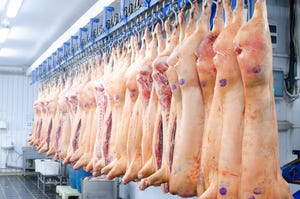Iowa Environmental Steward Award winners announced
Farm uses low disturbance manure application, cover crops, strip tillage and a bioreactor.
February 11, 2021

Just like marketing their pigs, or planting and harvesting their field crops, soil and water conservation efforts are part of the yearly plan that Mike and Michelle Ehlers of Marathon put together. For their efforts, and willingness to help educate other farmers about changes they can make, too, the Ehlers are the Iowa Pork Producers Association (IPPA) 2020 Iowa Environmental Steward Award winners.
Their farm operation was evaluated on manure/nutrient management, soil and water conservation, air quality, public relations, wildlife habitat and environmental management innovations. Their award was presented at the 2021 Iowa Pork Congress awards.
Mike said he learned to appreciate conservation practices early on as he grew up on the family farm that is nearby to where he and Michelle now live. During his youth, the Ehlers family used ridge-till, a planting process on elevated rows in their fields. Today, the farm operation includes Mike's family, Mike's parents, and his brother Kris' family, too. To support the three families, the number of crop acres has grown but so have the number of environmental practices they use in the area that is the headwaters of the North Raccoon River Watershed that spans from Buena Vista County to Polk County.
The Ehlers use no-till and strip-till on all their crop acres while making sure cover crops also blanket most of those acres. Additionally, buffer strips surround some fields to stop or at least slow down any soil movement that might be carrying nitrogen or phosphorus away from the field.
Adopting practices to protect water quality
"We care about water quality on our farm. In our operation, we started with low disturbance manure application, cover crops, strip tillage, and then added a bioreactor," Mike said. "We've just completed our third year with the bioreactor, and the results so far are amazing. We've seen nitrate reduction from 85 to 100%, proving a varied combination of practices can make a positive difference in Iowa water quality."
The Ehlers' finish pigs for The Maschhoffs, and they test the manure that comes from the barn so they can plan for where it will be applied. In the fall, they use low-disturbance manure application. Then, in the spring, they go in with a strip-till machine and freshen up the manure strips and plant right into that same area to give the seed the best nutrients for the best yields, Mike said.
With roots in conservation, he said adopting fresh practices has come naturally. The couple learns a lot from reading magazines and attending workshops offered by the USDA’s Natural Resources Conservation Service (NRCS). Through years of building relationships, NRCS officials often will approach the Ehlers about trying new ideas and programs.
The Ehlers recognize the value of aesthetics and odor mitigation on their farm. Trees such as evergreens and bald cypress trees provide nesting spots for birds and offer food sources and protection from predators. In addition, trees assist with snow control during the winter months, and produce shade in the summer, helping to conserve energy.
Most recently, the Ehlers installed a pollinator habitat in "wet holes" or low areas of farm ground that often have to be replanted. Instead of tiling, they took five acres out of production and seeded it down with plants that provide nectar or pollen for species like butterflies and bees.
Sharing information is important
The Ehlers are known for hosting conservation "field days" so others get a first-hand look at how a conservation practice works on the farm. In fall 2015, a public event about low-disturbance manure application attracted nearly 100 participants to their site. Equipment manufacturers, livestock farmers-including Mike, and custom manure applicators demonstrated and discussed how new technologies can help meet water quality goals of the Iowa Nutrient Reduction Strategy, as well as improve soil health.
"People just want to ask questions," Michelle said. "They just need somebody who's done it. Sitting upon a panel is great, but the real discussion comes around a plate of cookies afterward."
Community involvement is important to the Ehlers. They serve as co-presidents of the Buena Vista County Pork Producers. Michelle is a 4-H leader, and both she and Mike assist with the Special Swine Program that allows 4-Hers—particularly those with no access to livestock or facilities—to receive hogs from The Maschhoffs to care for and show during the Buena Vista County Fair. Their son, Clayton, 16, helps with the pigs and runs his own 10-acre test plot of crops, and owns and manages a poultry flock selling eggs and broilers. Their daughter Allison, 14, also does chores around the farm, plus tends to a garden plot where she grows flowers to sell at farmers’ markets.
At the 2016 Iowa State Fair, the Ehlers received the Iowa Farm Environmental Leader Award, which recognizes those who are committed to healthy soils and improved water quality. Mike and Michelle live by the motto: "Best practices continue to evolve but putting it all in our head and not using the heart to share that knowledge means it dies with us."
"Pig farmers take environmental management and regulations designed to protect our natural resources very seriously," said Drew Mogler, the public policy director at the Iowa Pork Producers Association.
The Ehlers received a $2500 cash award for being recognized as 2020 Iowa Environmental Steward Award winners. Nancy Bohl Bormann, an environmental services manager for The Maschoffs received a $500 award for nominating them.
You May Also Like
.png?width=300&auto=webp&quality=80&disable=upscale)


